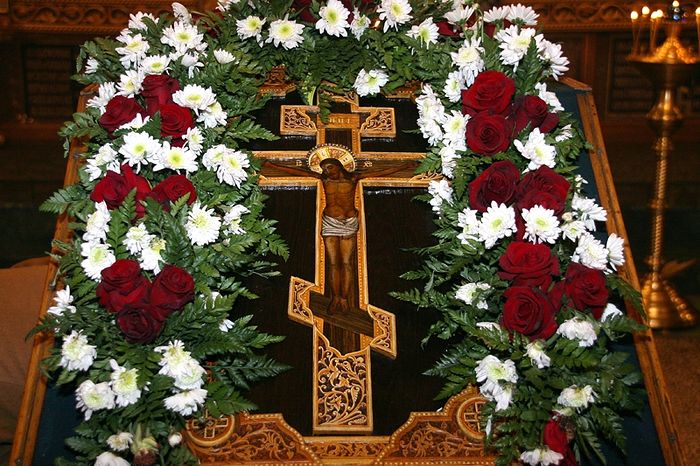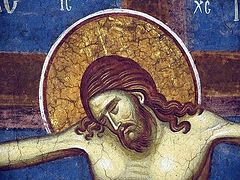In the name of the Father and of the Son and of the Holy Spirit!
I greet you all with the feast of the Sunday of the Veneration of the Cross. Today the Church, in the heart of Great Lent, when we are already exhausted from fasting, offers us all a wondrous remedy—the veneration of the tree of the crucified Savior Christ. It’s a wondrous work of the Church that shows its true spiritual wisdom. What is the Cross of the Lord?
What is the sign of the crucified Lord that stands before us, and to which we will render honor today with our minds, lips, and hearts? It is a sign of inconceivable Divine love! If we look closely at the Crucifix, then we will see the sign of the terrible, most excruciating death, when square nails pierce His hands and feet, when His blood flows, when He suffocates from edema of the lungs, when He hangs disgraced, and His enemies walk nearby and taunt him, saying, If You are the king of the Jews, save Yourself (Lk. 23:37), and Come down from the cross (Mk. 15:30).
But if we penetrate into the depths of the Cross of the Lord with our mind’s eye, then we will see that it was not the anger and hatred of the Jews, not the beastly anger of the first angel Lucifer, not the villainy and avarice of Judas that elevated the Lord onto the Cross. We cannot say it’s a tragedy that Jesus Christ died on the Cross. Behind this fearful and terrible spectacle lies awe-inspiring Divine love.
As the holy apostle Peter says, But with the precious blood of Christ, as of a lamb without blemish and without spot: Who verily was foreordained before the foundation of the world, but was manifest in these last times for you, Who by him do believe in God, that raised him up from the dead, and gave him glory; that your faith and hope might be in God (1 Pt. 1:19-21).
Christ was ordained for this sacrifice from before the beginning of the world. When Christ shaped man out of the dust of the earth, He already saw how the created hands of man would nail Him to the tree. When He breathed a soul through the mouth of man, He already knew that this mouth would spit upon Him. He also knew that out of His suffering, out of the wood of the Cross would grow a new generation of people, a new type of living beings—Christians, children of God the Father, for whom He would be the progenitor. He also knew that the Spirit of God would, through His Cross, transfigure men, and they would become gods by grace.
Therefore, His suffering is that suffering that He receives willingly and says, Ready is my heart, O God, ready is my heart (Ps. 56:8).
His passion is the passion of God, Who knows what He is headed for. It is death, to make man immortal. And as St. Philaret of Moscow said, “If you are penetrated through with the deep mystery of the Cross, then you will see nothing there except for the love of God the Father crucifying His Son, the love of God the Son dying on the Cross, and the love of the Holy Spirit exulting in the sacrifice of the Cross.” This Divine love, concealed behind all these horrors of the Crucifixion, evokes awe in us and helps us to correctly relate to our own sufferings.
Things can be bad and horrible, sometimes we are betrayed and treated unjustly. But if we unite our sufferings with the Lord’s sufferings, if we say, “In the name of the crucified Lord I will endure this suffering,” as the martyrs who endured suffering and death for Christ’s sake exclaimed, then we will see that Divine love is also concealed behind these sufferings. Many ask during suffering, “Why?” But such a question is wrong. It should be: “God, why hast Thou given this to me? To what end?”
Behind the sufferings of a Christian is concealed the love of God, which says, This thing is from me (3 Kg. 12:24). St. Seraphim of Vyritsa wrote that all sorrows, troubles, and sufferings that happen to every one of us are all from the Lord, that we would sever our souls from earthly things that adhere to corruption and death. God cuts us off in order to fill us with His love and life, that you would not feed upon the mortal life that causes death.
Our life truly is saturated with death, but the Lord turns this death into an instrument of resurrection, and our suffering into a manifestation of His glory in our lives (if we will help Him in this). And therefore, today the Church brings the Cross out before our eyes for veneration, that we, having seen, might unite our sorrows, our sufferings from sickness, our unhappiness, with the sufferings of the God-Man, to thereby become partakers of His glory and His Resurrection. On the mystical Paschal night we will sing these words: “Yesterday I was buried with Thee, O Christ; today I rise with Thine arising. Yesterday I was crucified with Thee; do Thou Thyself glorify me with Thee, O Savior, in Thy Kingdom!” Whoever has not died with Christ shall not rise again with Him. Whoever has not co-suffered with Christ, has not endured this pain as pain with Christ, shall never be able to feel the Divine joy of Christ.
It is with good reason that St. Ephraim says that in Paradise there are none who were not crucified. All there have suffered, all have endured, but not by their own strength, but together with Christ, in Christ, and for Christ.
Then this pain will refine and purify and enlighten us, and we will be people penetrated and sanctified by the tree of the Cross, which will ever be in our hearts. Then we will truly be able to see the mystery of the new grave that buds forth life for us. May the Cross of the Lord bloom in our hearts and bring its fruit to our ailing hearts. May the Cross of the Lord teach us to see that everything is from God, and not from enemies, Masons, Jews, or the devil. Every evil being that comes to us is but an instrument in the hands of the Heavenly Father, Who attunes us to the imperishable life beyond the bounds of time, accessible only to those who have purified themselves from all impurities by the power of the honorable Cross.
May the Lord save you.





